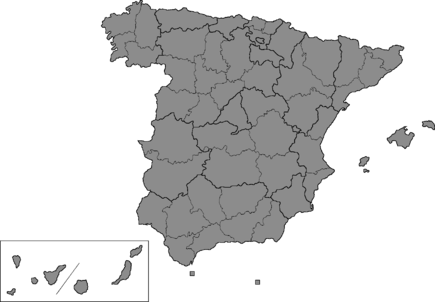European Parliament election, 2019 (Spain)
|
| |||||||||||||||||||||||||||||||||||||||||||||||||||||||||||||
| |||||||||||||||||||||||||||||||||||||||||||||||||||||||||||||
All 59 Spanish seats in the European Parliament | |||||||||||||||||||||||||||||||||||||||||||||||||||||||||||||
|---|---|---|---|---|---|---|---|---|---|---|---|---|---|---|---|---|---|---|---|---|---|---|---|---|---|---|---|---|---|---|---|---|---|---|---|---|---|---|---|---|---|---|---|---|---|---|---|---|---|---|---|---|---|---|---|---|---|---|---|---|---|
| Opinion polls | |||||||||||||||||||||||||||||||||||||||||||||||||||||||||||||
| |||||||||||||||||||||||||||||||||||||||||||||||||||||||||||||
 Provincial results map for the European Parliament in Spain | |||||||||||||||||||||||||||||||||||||||||||||||||||||||||||||
The 2019 European Parliament election in Spain will be held on Sunday, 26 May 2019, as part of the EU-wide election to elect the 9th European Parliament. All 59 seats allocated to Spain as per the Treaty of Lisbon will be up for election. The election will be held simultaneously with regional elections in thirteen autonomous communities and local elections all throughout Spain.[1]
Due to the Brexit process, the United Kingdom's 73 MEPs are expected to be removed a few months before the 2019 European Parliament election. Plans emerging from discussion on what should be done about the vacated seats include their replacement with a pan-European constituency list; other options being considered include dropping the British seats without replacement, and reassigning some or all of the existing seats from other countries to reduce inequality of representation.[2] An apportionment of seats based on the Cambridge Compromise would see the Spanish MEP delegation being increased to a figure ranging from 57 to 70 seats.[3] The European Parliament Committee on Constitutional Affairs proposed on 23 January 2018 an increase of the number of seats allocated to Spain from 54 to 59 after the United Kingdom's departure, a proposal that first needs to be adopted by the Parliament, then approved by the European Council, to be made effective.[4][5]
Electoral system
The 59 members of the European Parliament allocated to Spain as per the Treaty of Lisbon are elected using the D'Hondt method and a closed list proportional representation, with no threshold being applied in order to be entitled to enter seat distribution. However, the use of the D'Hondt method may result in an effective threshold depending on the district magnitude.[6] Seats are allocated to a single multi-member constituency comprising the entire national territory. Voting is on the basis of universal suffrage, which comprises all nationals and resident non-national European citizens over eighteen and in full enjoyment of their political rights.[7][8][9] Amendments to the electoral law in 2011 required for Spaniards abroad to apply for voting before being permitted to vote, a system known as "begged" or expat vote (Spanish: Voto rogado).[10]
The electoral law provides that parties, federations, coalitions and groupings of electors are allowed to present lists of candidates. However, they are required to secure the signature of at least 15,000 registered electors. Electors are barred from signing for more than one list of candidates. Parties, federations and coalitions are allowed to replace this requirement with the signature of at least 50 elected officials—deputies, senators, MEPs or members from the legislative assemblies of autonomous communities or from local city councils—. Concurrently, parties and federations intending to enter in coalition to take part jointly at an election are required to inform the relevant Electoral Commission within ten days from the election call.[7][8]
Opinion polls
The table below lists voting intention estimates in reverse chronological order, showing the most recent first and using the dates when the survey fieldwork was done, as opposed to the date of publication. Where the fieldwork dates are unknown, the date of publication is given instead. The highest percentage figure in each polling survey is displayed with its background shaded in the leading party's colour. If a tie ensues, this is applied to the figures with the highest percentages. The "Lead" column on the right shows the percentage-point difference between the parties with the highest percentages in a given poll. When available, seat projections are also displayed below the voting estimates in a smaller font.
| Polling firm/Commissioner | Fieldwork date | Sample size | Turnout | CEU | LPD | Lead | |||||||||||||
|---|---|---|---|---|---|---|---|---|---|---|---|---|---|---|---|---|---|---|---|
| electoPanel/electomania.es[p 1] | 26 May–2 Jun 2018 | 2,043 | ? | 17.2 11 |
21.6 14 |
w.UP | w.UP | 0.2 0 |
4.1 2 |
3.3 2 |
22.7 14 |
1.4 0 |
2.8 1 |
4.6 3 |
4.2 2 |
w.CEU | w.CEU | 16.8 10 |
1.1 |
| Desk Research/PSOE[p 2] | 21 May 2018 | ? | 63 | 23.6 15/16 |
26.4 17/19 |
4.0 2 |
7.7 5 |
– | – | – | 18.2 12/13 |
– | – | – | – | – | – | – | 2.8 |
| PP[p 3] | 10 Apr 2018 | ? | ? | 22.0 14 |
22.0 14 |
6.0 4 |
11.4 7 |
1.8 1 |
– | 2.8 1 |
16.2 10 |
– | 2.6 1 |
4.2 2 |
2.3 1 |
4.6 3 |
2.4 1 |
– | Tie |
| Desk Research/PSOE[p 2][p 4][p 5] | 9 Apr 2018 | 10,000 | 63 | 24.0 16/17 |
26.0 17/19 |
4.0 2 |
8.0 5 |
– | – | – | 17.0 11/12 |
– | – | – | – | – | – | – | 2.0 |
| 2014 EP election | 25 May 2014 | N/A | 43.8 | 26.1 16 |
23.0 14 |
10.0 6 |
8.0 5 |
6.5 4 |
5.4 3 |
4.0 2 |
3.2 2 |
2.1 1 |
1.9 1 |
1.6 0 |
1.1 0 |
w.CEU | w.CEU | – | 3.1 |
Notes
- ↑ Currently in preventive detention in Lledoners (Barcelona).
References
- Opinion poll sources
- ↑ "ElectoPanel elecciones europeas. Irrumpen los pequeños". electomania.es (in Spanish). 5 June 2018.
- 1 2 "El PSOE se marca el reto de "capitalizar la desafección por la lucha PP-Cs" en el centro". El Confidencial (in Spanish). 21 May 2018.
- ↑ "Una encuesta de Moncloa para las europeas pronostica escaños para Vox, UPyD y PACMA". El Independiente (in Spanish). 10 April 2018.
- ↑ "Un estudio del PSOE le sitúa como primera fuerza en municipales y europeas". Cadena SER (in Spanish). 9 April 2018.
- ↑ "La primera fuerza en las europeas". PSOE (in Spanish). 9 April 2018.
- Other
- 1 2 "El 26 de mayo de 2019: elecciones europeas, autonómicas y municipales". Telecinco (in Spanish). 20 March 2018. Retrieved 31 March 2018.
- ↑ De la Baume, Maïa (12 April 2017). "MEPs debate who inherits British seats". Politico. Retrieved 22 July 2017.
- ↑ Kalcik, Robert; B. Wolff, Guntram (16 December 2015). "Is Brexit an opportunity to reform the European Parliament?" (PDF). bruegel.org. Retrieved 22 July 2017.
- ↑ "EUOBSERVER : France, Spain set to gain seats in post-Brexit EU parliament". FOCUS Information Agency (in Bulgarian). Retrieved 23 January 2018.
- ↑ "MEPs to vote on shrinking Parliament post Brexit". POLITICO. 23 January 2018. Retrieved 23 January 2018.
- ↑ Gallagher, Michael (30 July 2012). "Effective threshold in electoral systems". Trinity College, Dublin. Retrieved 22 July 2017.
- 1 2 "General Electoral System Organic Law of 1985". Organic Law No. 5 of 19 June 1985. Official State Gazette (in Spanish). Retrieved 6 March 2017.
- 1 2 "Representation of the people Institutional Act". juntaelectoralcentral.es. Central Electoral Commission. Retrieved 16 June 2017.
- ↑ "Treaty of Lisbon amending the Treaty on European Union and the Treaty establishing the European Community". Act of 17 December 2007. Official Journal of the European Union. Retrieved 21 July 2017.
- ↑ Reig Pellicer, Naiara (16 December 2015). "Spanish elections: Begging for the right to vote". cafebabel.co.uk. Retrieved 17 July 2017.
.jpg)
.jpg)
.jpg)
.jpg)
.jpg)
